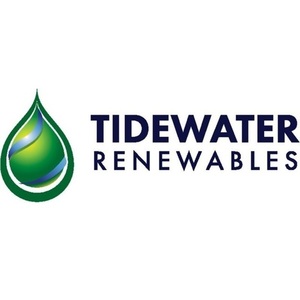Tidewater: Renewable diesel production ramps up, work continues on proposed SAF project

May 9, 2024
BY Erin Voegele
Tidewater Renewables Ltd. on May 9 reported that its renewable diesel facility in Prince George, British Columbia, operated well during the first quarter. The company also made significant progress on the front-end engineering design (FEED) for its proposed sustainable aviation fuel (SAF) project.
Tidewater’s renewable diesel and renewable hydrogen (HDRD) complex in Prince George currently has a nameplate capacity of 3,000 barrels per day. The complex achieved average daily throughput of approximately 2,120 barrels per day during the first quarter, representing a 71% utilization rate. The utilization rate expanded to approximately 95% in April and the HDRD complex is currently expected to achieve an 85% utilization rate for the full year 2024, which equates to an average daily throughput rate of 2,550 barrels per day.
The company said the HDRD complex’s strong operating performance during the first quarter was supported by robust demand for renewable fuels and record Canadian emissions credit pricing.
Advertisement
Advertisement
Also during the first quarter, Tidewater said it made significant progress on FEED for its proposed 6,500-barrel-per-day SAF project. The company said it continues to progress commercial arrangements and is evaluating potential offtake agreements for SAF. A final investment decision is expected in 2025.
During an earnings call, Tidewater CEO Jeremy Baines said the company is very focused on the proposed SAF project and has significant parts of its team working on getting all the things that go into FEED complete, including stakeholder consultations and regulatory approvals. The company is also working to develop a renewable natural gas (RNG) project. Baines said the RNG project is working through some regulatory permitting but is not the main focus of the Tidewater team at this time.
Advertisement
Advertisement
Related Stories
The U.S. Energy Information Administration maintained its forecast for 2025 and 2026 biodiesel, renewable diesel and sustainable aviation fuel (SAF) production in its latest Short-Term Energy Outlook, released July 8.
XCF Global Inc. on July 10 shared its strategic plan to invest close to $1 billion in developing a network of SAF production facilities, expanding its U.S. footprint, and advancing its international growth strategy.
U.S. fuel ethanol capacity fell slightly in April, while biodiesel and renewable diesel capacity held steady, according to data released by the U.S. EIA on June 30. Feedstock consumption was down when compared to the previous month.
XCF Global Inc. on July 8 provided a production update on its flagship New Rise Reno facility, underscoring that the plant has successfully produced SAF, renewable diesel, and renewable naphtha during its initial ramp-up.
The USDA’s Risk Management Agency is implementing multiple changes to the Camelina pilot insurance program for the 2026 and succeeding crop years. The changes will expand coverage options and provide greater flexibility for producers.
Upcoming Events










